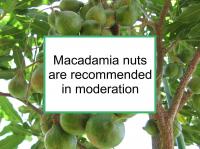Macadamia nuts (Macadamia integrifolia) are an excellent dietary source of manganese and thiamin (vitamin B1) and a very good source of fiber. They also contain some copper, iron and magnesium. Macadamia nuts have high caloric and fat content, however consuming a moderate amount of nuts does not appear to result in weight gain.
While tree nuts generally are good sources of numerous phytochemicals, the phytochemical content of macadamia nuts appears to be comparatively low. Macadamia nuts have the highest oil content of any nuts, and much of the interest in this food concerns the impact of its oils on health. Macadamia nuts are a very good dietary source of monounsaturated fatty acids, or MUFAs, (including approximately 60% oleic acid and 19% palmitoleic acid content) and do not contain cholesterol. In fact, they have been shown to improve cholesterol profile and other markers of coronary artery disease.
Breast cancer-related effects of eating macadamia nuts
Higher intake of tree nuts has been linked to lower breast cancer risk, and ER- breast cancer in particular, however not all studies are in agreement and macadamia nuts are in any case different enough from other nuts that this finding might not hold for them. There are no available epidemiological studies that isolate the possible impact of macadamia nut consumption on cancer risk for U.S. or European populations. Nor are there animal studies concerning macadamia nut intake and mammary tumor development or cell studies examining the influence of macadamia nut extract on breast cancer cell proliferation, angiogenesis or death.
At approximately 6.3, the omega-6 to omega-3 fatty acid ratio of macadamia nuts is not as favorable as that of walnuts (4.2), but it is superior to other nuts. A low dietary omega-6 to omega-3 ratio has been linked to reduced breast cancer risk. However, most macadamia nut fatty acids are classified as omega-9 (oleic acid) or omega-7 (palmitoleic acid), so the omega-6/omega-3 ratio may not be relevant.
Existing studies concerning macadamia nut component fats have reported inconsistent conclusions. Oleic acid, which is also an important part of extra-virgin olive oil, has been found to suppress HER-2/neu overexpression and to enhance the breast cancer growth-inhibitory effects of trastuzumab (Herceptin). On the other hand, oleic acid has also been found to be associated with increased breast cancer cell proliferation and higher breast cancer incidence. Other components of olive oil may act synergistically with oleic acid to help prevent breast cancer, which would help account for the chemopreventive effects of extra-virgin olive oil reported in population studies.
Palmitoleic acid was found in one 2009 study to be associated with lower risks of both benign fibrocystic breast disease and breast cancer. However, palmitoleic acid has also been linked to higher risk of breast cancer.
Bottom line
There is not enough available evidence to form a conclusion concerning the relationship between the combination of fats and other micronutrients in macadamia nuts and breast cancer risk.
Additional comments
Macadamia nut oil has a high smoke point, so that it can be used as a cooking oil.
Below are links to recent studies concerning this food and its components. For a more complete list of studies, please click on macadamia nut.
